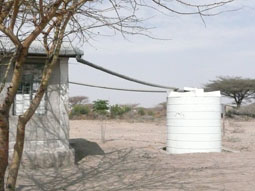15.1.1 Rainwater
Rainwater can be used for domestic purposes in areas where there are no alternative sources of water such as springs, rivers and lakes, or where these sources of water are contaminated. The term rainwater harvesting is sometimes used. It simply means collecting, or harvesting, rainwater as it runs off from hard surfaces such as rooftops and storing it in a tank or cistern (Figure 15.1).
The main advantage of rainwater is that it is free. It is fairly reliable though obviously dependent on the amount of rain that falls. It does not usually require pumps or pipes and is available at the doorstep. Using rainwater can reduce the burden on women and children who typically are the water carriers in Ethiopia and walk long distances to fetch inadequate supplies.

15.1 Sources of drinking water
